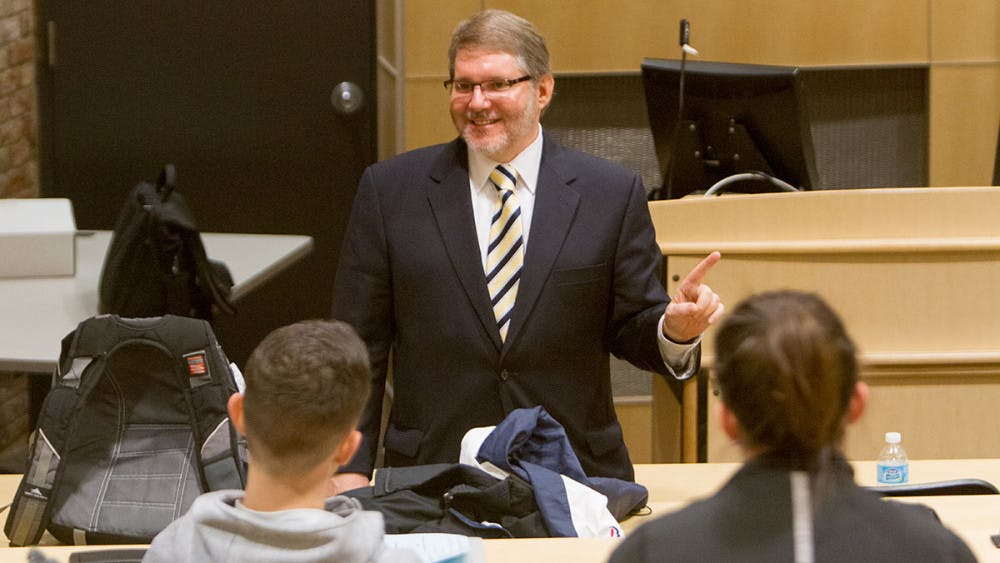By Mylin Batipps
Social Media Editor
After almost six years of working for the College as a Russian professor and more visibly as the dean for the School of Humanities and Social Sciences, Benjamin Rifkin will be leaving permanently in May for a position at Ithaca College in New York.

Rifkin will be Ithaca’s provost and vice president for Educational Affairs.
“That’s a very unusual title,” Rifkin said. “On most campuses, the title is ‘Provost and Vice President for Academic Affairs.’”
According to Rifkin, Ithaca decided to integrate Academic Affairs and Students Affairs in order to provide a learning experience for students wherever they go on the campus — not just in the classroom or on the athletic field.
“Ithaca made a strategic decision that it wanted one person to be the leader of these two divisions to integrate them,” Rifkin said. This would aim to revise the learning experience for students in a holistic experience that unfolds across campus, according to Rifkin.
And with a careful search process, Ithaca selected Rifkin to be the leader. According to Rifkin, most institutions hire a search firm to create a job ad announcement, which would usually be placed in the Chronicle for Higher Education — higher education’s leading journal. The search firm would then send a consultant to institutions to find suitable candidates.
Rifkin’s consultant, Julie Tea, reached out to him and notified him that he was nominated multiple times for Ithaca’s position.
“She sent me the description of the job and I found it very interesting,” he said. “So I said, ‘Oh … OK, I’ll apply,’ and I did. And one thing led to another, and now I’m selling my house!”
Rifkin had never been on Ithaca’s campus before applying to the job. But he was drawn in by the city’s progressive environment that is caring and focused on environmental issues.
“So I had a positive sense of that, and geographically, I’m just not willing in this stage of my life to relocate to a place where I would have to fly back to see my family,” Rifkin said. “So this is within driving range of my family and my wife’s family, and so that was still within a zone that we can consider.”
Rifkin has done more than what many students realize here at the College as dean for the School of Humanities and Social Sciences. Many tasks he has performed fall under leading both faculty and students of the school, which consists of 10 departments, 14 programs and one graduate program.
“One (task) is to ensure that the terms of employment for all of our faculty and staff are equitable,” he said. “Now I’m not the one negotiating a contract, but I could be the one saying, ‘Your workload far exceeds his or her workload. We have to redistribute here.’”
Although he doesn’t negotiate the contracts, Rifkin does play a large role in hiring tenure-stream faculty and reappointing them. The review process for reappointment starts with him before it reaches to the provost, followed by President R. Barbara Gitenstein and the Board of Trustees.
Rifkin has also worked closely with faculty to make sure their curricula reflect students’ best interests.
“For instance, students are going to have a public speaking requirement that’s going to be embedded in their classes in their major,” Rifkin said. “So these are things that I help with leading the discussion to move it forward by saying, ‘Should we be doing this?’ And the answer was yes.”
At the end of the day, Rifkin’s job as dean is always about the students’ best interests. This is seen at the start of every week, when students receive an email addressed from Rifkin that informs them about future opportunities like study abroad sessions, in addition to congratulating students for their various accomplishments.
Along with the weekly emails, Rifkin has also sent many emails inviting students to sit down and have coffee, lunch or dinner with him.
“I just feel that in a lot of the things I need to do, I need to prioritize the needs and experiences of our students.” he said. “I wasn’t having enough contact with them,” he said. “And so, I was trying to figure out how to make myself available, and I decided, ‘Well … I’m going to have lunch in the dining hall.’”
Many students have asked Rifkin whether he will continue his beloved traditions at Ithaca.
“I’m not sure,” Rifkin said. “Those things are things that are appropriate for my role at (the College), and I’m going to have a different role at Ithaca.”
Senior English and women’s and gender studies double major Amy Chen said that although she has never attended one of his lunch or coffee sessions, she plans on doing so in the near future.
“One thing I’ll miss is his Puppypalooza and him bringing Webster to campus, because that’s always really fun,” Chen said. “And he just seems like a really fun and entertaining guy.” Webster was Rifkin’s beloved golden retriever who passed away last year.
There are many things that Rifkin will miss about the College, he said, a key one being its academic priority.
“I think one of the things that I really cherish about this place is that the number one priority at (the College) is student education,” Rifkin said. “In every meeting I’m in, every decision being made is based on the question, ‘What is the impact on our student education?’ And trust me … that’s not the case everywhere else in higher education.”







